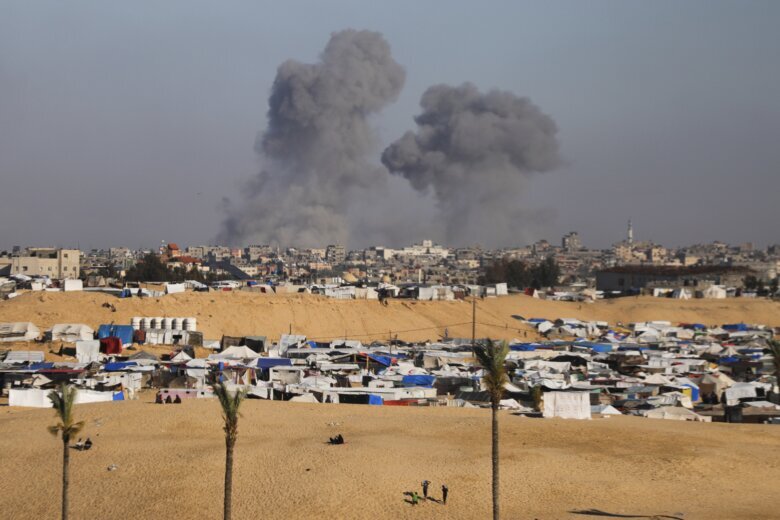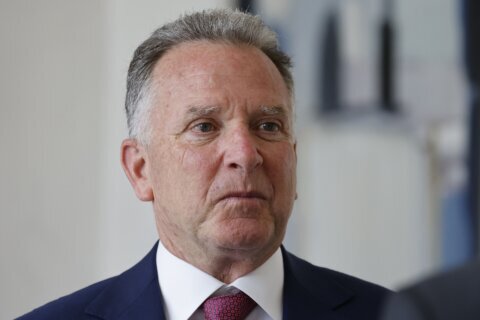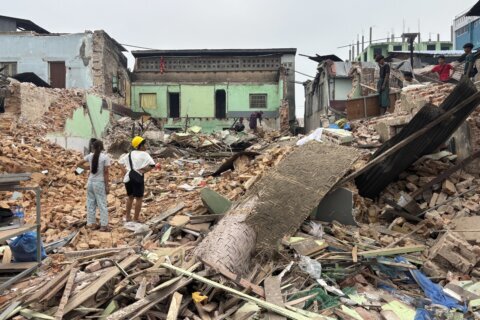
WASHINGTON (AP) — President Joe Biden said that he would not supply offensive weapons that Israel could use to launch an all-out assault on Rafah — the last major Hamas stronghold in Gaza — over concern for the well-being of the more than 1 million civilians sheltering there.
Biden, in an interview with CNN on Wednesday, said that the U.S. was still committed to Israel’s defense and would supply Iron Dome rocket interceptors and other defensive arms but that if Israel goes into Rafah, “we’re not going to supply the weapons and artillery shells used.”
Biden acknowledged that “civilians have been killed in Gaza” by the type of heavy bombs that the U.S. has been supplying — his first validation of what administration critics have been loudly protesting, even if he still stopped short of taking responsibility. His threat to hold up artillery shells expanded on earlier revelations that the U.S. was going to pause a shipment of heavy bombs.
The U.S. has historically provided enormous amounts of military aid to Israel. That has only accelerated in the aftermath of Hamas’ Oct. 7 attack, which killed some 1,200 people in Israel and led to about 250 being taken captive by militants. Biden’s comments and his decision last week to pause the shipment of heavy bombs to Israel are the most striking manifestations of the growing daylight between his administration and Israel Prime Minister Benjamin Netanyahu’s government. Biden said Wednesday that Israel’s actions around Rafah had “not yet” crossed his red lines, but has repeated that Israel needs to do far more to protect the lives of civilians in Gaza.
The shipment was supposed to consist of 1,800 2,000-pound (900-kilogram) bombs and 1,700 500-pound (225-kilogram) bombs, according to a senior U.S. administration official who spoke on the condition of anonymity to discuss the sensitive matter. The focus of U.S. concern was the larger explosives and how they could be used in a dense urban area.
“Civilians have been killed in Gaza as a consequence of those bombs and other ways in which they go after population centers,” Biden told CNN. “I made it clear that if they go into Rafah — they haven’t gone in Rafah yet — if they go into Rafah, I’m not supplying the weapons that have been used historically to deal with Rafah, to deal with the cities, that deal with that problem.”
“We’re not walking away from Israel’s security,” the Democratic president continued. “We’re walking away from Israel’s ability to wage war in those areas.”
Defense Secretary Lloyd Austin earlier Wednesday confirmed the weapons delay, telling the Senate Appropriations Subcommittee on Defense that the U.S. paused “one shipment of high payload munitions.”
“We’re going to continue to do what’s necessary to ensure that Israel has the means to defend itself,” Austin said. “But that said, we are currently reviewing some near-term security assistance shipments in the context of unfolding events in Rafah.”
It also comes as the Biden administration is due to deliver a first-of-its-kind formal verdict this week on whether the airstrikes on Gaza and restrictions on delivery of aid have violated international and U.S. laws designed to spare civilians from the worst horrors of war. A decision against Israel would further add to pressure on Biden to curb the flow of weapons and money to Israel’s military.
Biden signed off on the pause in an order conveyed last week to the Pentagon, according to U.S. officials who were not authorized to comment on the matter. The White House National Security Council sought to keep the decision out of the public eye for several days until it had a better understanding of the scope of Israel’s intensified military operations in Rafah and until Biden could deliver a long-planned speech on Tuesday to mark Holocaust Remembrance Day.
Biden’s administration in April began reviewing future transfers of military assistance as Netanyahu’s government appeared to move closer toward an invasion of Rafah, despite months of opposition from the White House. The official said the decision to pause the shipment was made last week and no final decision had been made yet on whether to proceed with the shipment at a later date.
U.S. officials had declined for days to comment on the halted transfer, word of which came as Biden on Tuesday described U.S. support for Israel as “ironclad, even when we disagree.”
Israel’s ambassador to the United Nations, Gilad Erdan, in an interview with Israeli Channel 12 TV news, said the decision to pause the shipment was “a very disappointing decision, even frustrating.” He suggested the move stemmed from political pressure on Biden from Congress, the U.S. campus protests and the upcoming election.
The decision also drew a sharp rebuke from House Speaker Mike Johnson and Senate Republican Leader Mitch McConnell, who said they only learned about the military aid holdup from press reports, despite assurances from the Biden administration that no such pauses were in the works. The Republicans called on Biden in a letter to swiftly end the blockage, saying it “risks emboldening Israel’s enemies,” and to brief lawmakers on the nature of the policy reviews.
Biden has faced pressure from some on the left — and condemnation from the critics on the right who say Biden has moderated his support for an essential Mideast ally.
Former President Donald Trump, entering a New York courthouse for his criminal trial over hush money payments, criticized Biden as well, saying Thursday that “What Biden is doing with respect to Israel is disgraceful.” The presumptive GOP presidential nominee added, “If any Jewish person voted for Joe Biden, they should be ashamed of themselves. He’s totally abandoned Israel.”
Independent Sen. Bernie Sanders of Vermont, a Biden ally, said in a statement the pause on big bombs must be a “first step.”
“Our leverage is clear,” Sanders said. “Over the years, the United States has provided tens of billions of dollars in military aid to Israel. We can no longer be complicit in Netanyahu’s horrific war against the Palestinian people.”
Austin, meanwhile, told lawmakers that “it’s about having the right kinds of weapons for the task at hand.”
“A small diameter bomb, which is a precision weapon, that’s very useful in a dense, built-up environment,” he said, “but maybe not so much a 2,000-pound bomb that could create a lot of collateral damage.” He said the U.S. wants to see Israel do “more precise” operations.
Israeli troops on Tuesday seized control of Gaza’s vital Rafah border crossing in what the White House described as a limited operation that stopped short of the full-on Israeli invasion of the city that Biden has repeatedly warned against, most recently in a Monday call with Netanyahu.
Israel has ordered the evacuation of 100,000 Palestinians from the city. Israeli forces have also carried out what it describes as “targeted strikes” on the eastern part of Rafah and captured the Rafah crossing, a critical conduit for the flow of humanitarian aid along the Gaza-Egypt border.
Privately, concern has mounted inside the White House about what’s unfolding in Rafah, but publicly administration officials have stressed that they did not think the operations had defied Biden’s warnings against a widescale operation in the city.
The State Department is separately considering whether to approve the continued transfer of Joint Direct Attack Munition kits, which place precision guidance systems onto bombs, to Israel, but the review didn’t pertain to imminent shipments.
Itamar Yaar, former deputy head of Israel’s National Security Council and CEO of Commanders for Israel’s Security, a group of former senior Israeli security officials, said the U.S. move is largely symbolic, but a sign of trouble and could become more of a problem if it is sustained.
“It’s not some kind of American embargo on American munitions support, but I think its some kind of diplomatic message to Mr. Netanyahu that he needs to take into consideration American interests more than he has over the last few months,” he said, adding it’s “a kind of a signal, a ‘be careful.’”
The U.S. dropped the 2,000-pound bomb sparingly in its long war against the Islamic State militant group. Israel, by contrast, has used the bomb frequently in the seven-month Gaza war. Experts say the use of the weapon, in part, has helped drive the enormous Palestinian casualty count that the Hamas-run health ministry puts at more than 34,000 dead, though it doesn’t distinguish between militants and civilians.
The U.S.-Israel relationship has been close through both Democratic and Republican administrations. But there have been other moments of deep tension since Israel’s founding in which U.S. leaders have threatened to hold up aid in an attempt to sway Israeli leadership.
President Dwight Eisenhower pressured Israel with the threat of sanctions into withdrawing from the Sinai in 1957 amid the Suez Crisis. Ronald Reagan delayed the delivery of F16 fighter jets to Israel at a time of escalating violence in the Middle East. President George H.W. Bush held up $10 billion in loan guarantees to force the cessation of Israeli settlement activity in the occupied territories.
__
Associated Press writers Josef Federman in Jerusalem and Lolita C. Baldor and Matthew Lee contributed to this report.
Copyright © 2025 The Associated Press. All rights reserved. This material may not be published, broadcast, written or redistributed.









